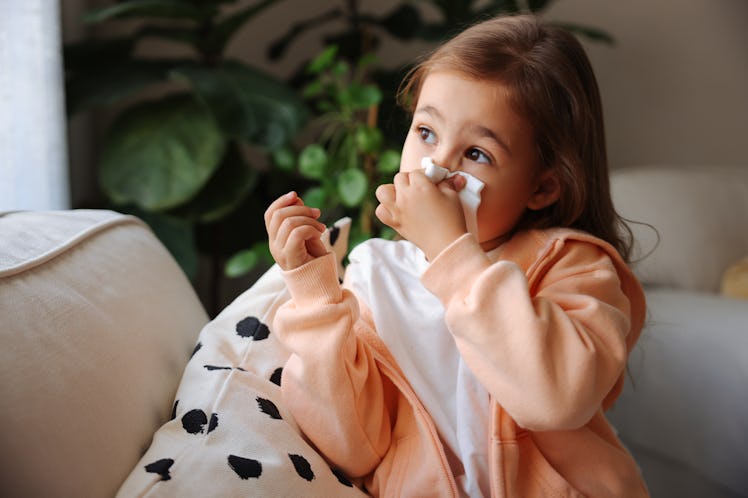This Common Cause Of Childhood Allergies Is Not What You'd Think
A new study has found a potential connection between your baby’s gut and their allergies.

Allergies: Either your kids have them, or you know a kid who has them. The most common childhood allergies, after all — eczema, hay fever, and food allergies — affect around 25% of school-aged children, and about 1 in 12 kids have asthma.
Because of the rising number of childhood allergies, a research team from the University of British Columbia and BC Children’s Hospital wanted to determine if there was a common link between the four most common allergic diseases — eczema (or atopic dermatitis), allergic rhinitis (hay fever), food allergies, and asthma.
“We’re seeing more and more children and families seeking help at the emergency department due to allergies,” study co-author Dr. Stuart Turvey, a pediatrics professor at the University of British Columbia and investigator at BC Children's Hospital Research Institute, explained in a statement. “Hundreds of millions of children worldwide suffer from allergies, including one in three children in Canada, and it’s important to understand why this is happening and how it can be prevented.”
Dr. Turvey’s team assessed data from 1,115 children from birth through age 5, 592 of whom had been diagnosed with at least one of the four most common pediatric allergies. The researchers analyzed bacteria found in stool samples collected from the children at 3 months and 1 year old.
Why stool samples? Because they contain a wealth of information about what’s going on in the gut. Trillions of bacteria colonize our guts, known as the gut microbiome, and the significant impact those colonies have on our health is only just now coming to light. Gut bacteria have been linked to immune function, central nervous system health, metabolism, inflammation, and heart health, and they play other more nuanced roles in health and disease. And now, this study adds to previous research that the gut microbiome could also be linked to allergies.
The newborn gut microbiome is nearly sterile, devoid of almost all bacteria. As they age, they come into contact with bacteria in their environments. Diet plays a significant role in what bacteria colonize the gut, but other factors — type of birth, environment, and exposure to antibiotics — also influence what brews in your kid’s belly. As the child ages, the microbiome matures and the bacteria become more prolific.
Turvey’s team discovered that the microbiomes of 5-year-old children who were diagnosed with allergies were less mature at 1 year old than 5-year-old children who did not live with allergies. The research was published in the journal Nature Connections.
“Typically, our bodies tolerate the millions of bacteria living in our guts because they do so many good things for our health. Some of the ways we tolerate them are by keeping a strong barrier between them and our immune cells and by limiting inflammatory signals that would call those immune cells into action,” explained lead author Courtney Hoskinson, a Ph.D. candidate at UBC. “We found a common breakdown in these mechanisms in babies prior to the development of allergies.”
The team determined that exposure to antibiotics in the first year of life could make a child more susceptible to allergies. Breastfeeding — which provides the infant’s gut with healthy prebiotics for bacteria to feed on — could protect against allergies as the child ages.
As to what it means for the future? “Developing therapies that change these interactions during infancy may, therefore, prevent the development of all sorts of allergic diseases in childhood, which often last a lifetime,” says Dr. Turvey.